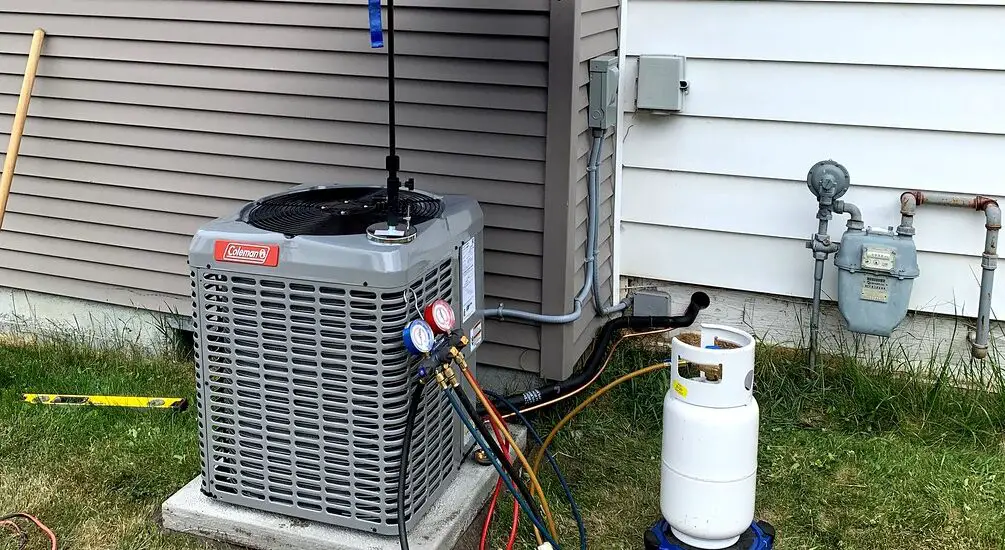Daikin refrigerant leak detection isn’t exactly a subject that comes up at your everyday dinner table, is it? Yet, it’s a vital piece of knowledge for every owner of a Daikin air conditioning unit. By the end of this chat, you’ll know exactly what to do if your unit starts to leak that precious, chill-inducing refrigerant.

This work is licensed under a Creative Commons Attribution 2.0 Generic License.
Table of Contents
Brief explanation of the importance of refrigerant in a Daikin air conditioning unit
Imagine refrigerant as the lifeblood of your Daikin air conditioner – it’s what keeps your summer days chill and winter nights warm. When there’s a leak, your unit can’t do its job. Think of your unit, panting and straining, trying to cool down your home without its vital coolant. Not a pretty picture, right?
Overview of what refrigerant leaks are and why they’re a concern
When your AC starts sweating coolant, that’s a refrigerant leak. It’s like a flat tire, but for your AC. And why should you care? Because if unchecked, these leaks can cause costly damage to your unit, not to mention environmental harm and health risks. Plus, who wants a sultry living room in the heart of summer?
Outlining the methods for detecting refrigerant leaks in a Daikin air conditioning unit
You’re here because you want to know how to catch a leak before it wreaks havoc, right? The key tools in your Daikin refrigerant leak detection toolkit are visual inspection, electronic leak detectors, the good old bubble test, and a cool technique using UV dye. Ready to get into the nitty-gritty?
Understanding Refrigerant Leaks
What is a Refrigerant Leak?
Put simply, a refrigerant leak is like a hole in the bottom of a bucket, but instead of water, it’s refrigerant that’s dripping away. It’s your AC unit’s worst nightmare and a fast track to a sweaty, uncomfortable day.
Why are Refrigerant Leaks Dangerous?
Aside from the personal discomfort of a malfunctioning AC unit, leaks are harmful to our planet, releasing greenhouse gases into the atmosphere. They can even cause health issues for those in the home if the leak is significant and prolonged. Not something to be taken lightly, eh?
How to Identify a Possible Refrigerant Leak
Some telltale signs can give away a refrigerant leak. Maybe your home isn’t cooling down as quickly, or your energy bills are going through the roof. Perhaps there’s a hissing sound coming from your unit, or there’s ice on the AC lines. Sound familiar?
To read more in-depth articles on refrigerants: Articles on Refrigerants: The Ultimate Guide to Understanding Them
Methods of Detecting Refrigerant Leaks in Daikin Air Conditioning Units
Visual Inspection
Finding Oil Stains or Residue
Start your leak hunting with a visual inspection. Oil stains or residue on your AC components are like footprints left behind by a refrigerant leak. A telltale sign that your unit has sprung a leak.
Checking for Ice Formation
Notice any ice forming on the refrigerant lines? This is another signal. When the refrigerant escapes, it cools the area around the leak and, voilà, ice formation. Pretty cool, huh? Or rather, not cool at all when it comes to your AC!
Using Electronic Leak Detectors
Another method in your Daikin refrigerant leak detection arsenal is the electronic leak detector. It’s like a metal detector, but instead of buried treasure, it’s sniffing out refrigerant leaks. Handy, right?
Bubble Test
Remember blowing bubbles as a kid? Well, the bubble test isn’t as fun, but it’s pretty effective. Apply soapy water to suspected leak areas and watch. If bubbles form, you’ve got a leak. Simple as that.
UV Dye Leak Detection
The UV dye test is like a CSI episode. You add a special dye to the refrigerant, which then circulates throughout the system. Got a UV light? Shine it on your unit. If there’s a leak, the dye will glow. Talk about high-tech, huh?
What to Do If You Detect a Refrigerant Leak in Your Daikin Unit
Switch Off Your AC Unit
Just like you wouldn’t keep driving a car with a flat tire, if you spot a leak, turn off your AC unit. It prevents further damage and is the first step to getting your chill back.
Contact a Certified Daikin Technician
Once you’ve turned off the unit, it’s time to call in the pros. A certified Daikin technician has the knowledge and tools to properly repair the leak and ensure your unit is running smoothly again. Because, let’s face it, nobody knows Daikin units better than they do, right?
Importance of Regular Maintenance
Want to know the secret to avoiding most leaks? Regular maintenance. Like going to the dentist or changing the oil in your car, regular check-ups can catch potential issues before they become big problems. Makes sense, doesn’t it?
Conclusion
So there you have it, your essential guide to Daikin refrigerant leak detection. Remember, early detection is the key to preventing costly repairs and sweaty summer days. So keep your eyes peeled, maintain your unit regularly, and you’ll be chilling in comfort for years to come!